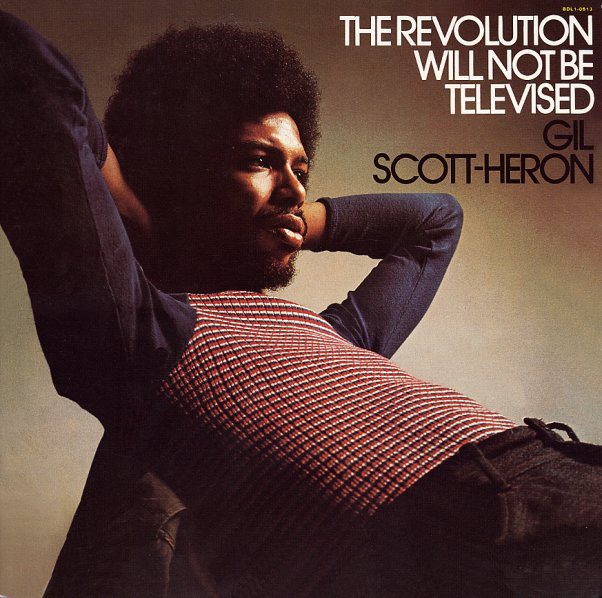 Gil Scott-Heron: "The theme song will not be written by Jim Webb, Francis Scott Key, nor sung by Glen Campbell, Tom Jones, Johnny Cash, Englebert Humperdink, or the Rare Earth." Boy is he gonna be pissed ...
Gil Scott-Heron: "The theme song will not be written by Jim Webb, Francis Scott Key, nor sung by Glen Campbell, Tom Jones, Johnny Cash, Englebert Humperdink, or the Rare Earth." Boy is he gonna be pissed ...I just read about yet another one of those lists, although I actually missed it by a week. Oh well, so did the Post .... So apparently Time has compiled a list of the greatest records of all-time. Every music nerd has an opinion and can painstakingly deconstruct such a list, and no one wants to read that (the authors, in fact, for all their mistakes, were smart enough to preempt that in their introductory graf, saying that it's intended to provoke discussion, which it probably would were it not in Time). Instead, I have broken down several lists by decade and race. Keep in mind, each of these lists purports to be the greatest records (not albums!) of all time.
So now, without further ado, the lessons I learned:
1. The recording industry began in the late 1950s with some guy names Elvis Presley. That's right, there were no recordings before then. It all began with Elvis, but some guy named Miles Davis picked up on it pretty quick and cut some record called Kind of Blue in 1959. It's sure a good thing that happened, 'cause what would hipsters do without discs to talk about? OK, so a couple of the lists (Rolling Stone and Time) include Robert Johnson's stuff, which ends up in the 1960s on my tally sheet because that's when the tracks were first compiled and re-issued. No consideration, however, of Louis Armstrong, Glenn Miller, Duke Ellington, Benny Goodman, Al Jolson, Charlie Parker, Charley Patton, etc. Or Miles' excellent Milestones, for example, which is better than f*&ing anything Tina Turner ever put out (I'm looking at you on this one, VH1).
2. Marvin Gaye is the greatest black musician the world has ever produced. Runners-up: Miles, Prince, Public Enemy, Jimi Hendrix, John Coltrane, Michael Jackson (yeah, about that ...). Actually, it might be more accurate to say that he produced the greatest black album of all time. What's Going On comes in at 27, 4, 6 and present (Time doesn't number), handily defeating all challengers. Jimi's close in places, and usually has between 1 and 3 records on the chart (except NME); both Bitches Brew and Kind of Blue rate consistenlty high; Purple Rain's a fave, as is It Takes a Nation of Millions to Hold Us Back. Based on frequency of appearance, Miles, Jimi and Jacko are actually the greatest black artists we've produced.
3. Rap's a mostly white art form. Apparently, there was some band called Public Enemy which was pretty important, and another called N.W.A. But if you really want to hear rap, you have to go to its most authentic proponents: the Beastie Boys and Eminem. Jay-Z, Nas, Wu-Tang, Dre, Eazy etc are amateurs compared to these cats. Which leads me to my next lesson ...
4. Black people haven't really had that much effect on the development of American popular music. Take it from these guys--American music didn't really grow out of the blues and Afro-American gospel forms. Amiri Baraka, Ellison--hell, every non-racist (and most likely some racists, too) critic ever--was wrong. That must explain why there are hardly any blues artists, only Miles and Trane as token jazz artists, very little soul, etc. Here are the number of "white" records vs. "black records":
Time: 64 vs. 36
Rolling Stone: 68 vs. 32
NME: 90 vs. 10
VH1: 71 vs. 29
[A note on methodology: Some of these were judgement calls; Jimi Hendrix Experience records were counted as black (with apologies to Noel and Mitch), while the Allman Brothers were counted as white (with apologies to Jaimoe).]
And finally,
5. The '60s and '70s were pretty much the greatest time for music. Ever. Unless you're one of the hipsters at NME, in which case you have to be contrarian (Hipster, n. translation: no historical memory) and have lots of albums from the '80s and '90s, too. 79 of Rolling Stone's top 100 were in these two decades, 48 for Time, 72 for VH1, 45 for NME.
Clearly, I'm joking here. Are the editors of all of these publications racists? I have to say no, and not only because I might try to get a job from some of them some day. And clearly the historical distribution of the music has more to do with the audience and authors, than, say, reality.
There was some hullaballoo a few months back when Sasha Frere-Jones suggested Stephin Merritt of the Magnetic Fields was a racist. See, Merritt made a list of the top 100 songs of all time or something and it had too few black artists for her tastes. Since my musical taste runs toward a lot of jazz and soul, I tend to like a lot of black artists and would imagine that a such a list would be poorer, but not racist.
Anytime you place the "all-time greatest" label on something, you're stepping in to dangerous waters; it's this overstepping of terminology that bothers me. Actually, the fact that NME's list is straight-up 90% white is concerning too, but whatever. Just watch your words, guys--and if you mean "since 1960, and not including any folk or classical records and only a choice few jazz records," then say that, dammit.
No comments:
Post a Comment